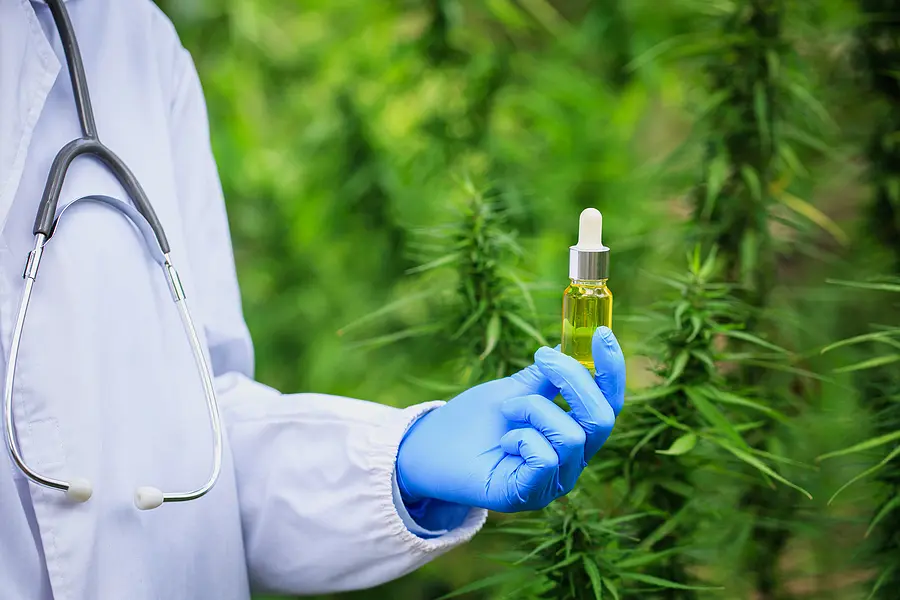Because of how new the interest is in CBD products and the surge in demand as a growing number of people embrace different oils, creams and gummies, a lot of new terminologies, techniques and production methods have entered common parlance.
One of these is synthetic CBD, which, unlike the natural CBD used in most products on the market, is not made from industrial hemp but instead is a molecule that is developed artificially in a laboratory and claims to have higher purity than even some CBD isolates.
As the differences can be quite complex, here is an explanation of what synthetic CBD is, why it has been made and how it compares to natural sources of CBD.
- What Is Synthetic CBD?
CBD, or cannabidiol, is one of the main compounds found in cannabis plants, along with THC. Unlike the psychoactive and illegal latter compound, CBD does not create a high and has been linked to several potential soothing effects.
It works by affecting the endocannabinoid system, which is a cell-signalling system that affects our response to pain, sleep and immune response, which is in part why it has been seen in a range of products from gummies and tablets to oils and creams.
Because of THC, cannabis plants are heavily controlled, and CBD is extracted from products that contain no more than 0.2 per cent THC, often known as industrial hemp and used in a wide range of other industries.
To ensure that the CBD used does not have more than the legal amount, or in cases where even tiny amounts can be flagged up such as employment and athletic drug tests, an alternative method for creating CBD is being explored that develops the compounds individually in a lab.
This is nothing new, and in fact, the first time CBD was synthesised in a laboratory was in 1965, not long after it was isolated for the first time, primarily because at the time acquiring natural cannabinoids had complex legal complications.
From a molecular standpoint, synthetic CBD is completely identical to natural CBD, just made from base materials as part of a chemical process.
- Why Is It Used?
Originally, synthetic CBD was invented to get around legal issues that were hampering research on cannabis, which would not be lifted for decades after the 1965 paper, and one of the biggest benefits of synthetic CBD is that there is no legal grey area surrounding its legality.
Whilst there is a little more literacy surrounding the topic of cannabinoids than there has been in the past, many of the laws around the world have been slow to make a distinction for CBD, which has led to issues with providing people with life-saving medication.
As well as this, it is easier and cheaper at scale to create artificial CBD isolate than use the complex carbon dioxide extraction process to take it from industrial hemp, especially once the bases and equipment are set up to do so.
This is nothing new in food and product creation either, with vitamin C as an additive often chemically engineered rather than extracted from the fruit.
Possibly the biggest example of this is vinegar, which in many restaurants is not actual malt vinegar but instead is ‘non-brewed condiment’: a mixture of water, ethanoic acid, colourings and flavourings used because it is cheaper, gluten-free and halal when malt vinegar is not.
Price is one of the largest considerations for synthetic CBD, as it takes significantly less time, money and space to produce the basic ingredient that is indistinguishable from a molecular level from CBD isolate in a laboratory rather than growing cannabis plants and extracting the CBD.
As well as this, CBD can sometimes have a mild sedative effect, which is not the case with synthetic strains, which can make it in some cases better when being used to treat children.
In practice, synthetic CBD’s main userbase will be in the pharmaceutical industry, as it could allow products such as Epidyolex (a treatment used for sufferers of rare types of epilepsy), Nabilone (for people in chemotherapy), and Sativex (for MS) to be made more cheaply and become more accessible.
- Is It Different To Natural CBD?
How different synthetic CBD is to naturally extracted CBD depends largely on the type of CBD extract that is being discussed.
There is very little difference between synthetic and natural CBD isolate, for example, as both use complex extraction processes to ensure that only CBD itself is included.
For broad-spectrum and full-spectrum products, on the other hand, there are considerable differences owing to the lack of a potential entourage effect.

